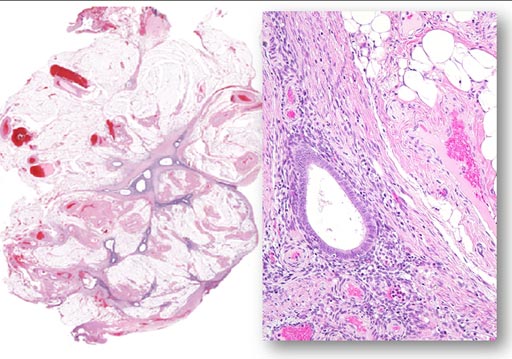Gene Sequencing Reveals Mutations in Endometriosis
By LabMedica International staff writers
Posted on 24 May 2017
Endometriosis occurs when tissue lining the uterus forms and grows outside of the organ, most often into the abdomen. The disease occurs in up to 10% of women before menopause and half of those with abdominal pain and infertility problems.Posted on 24 May 2017
Endometriosis is defined as the presence of ectopic endometrial stroma and epithelium and can cause pelvic pain and infertility. Endometriotic lesions are considered to be benign inflammatory lesions but have cancer like features such as local invasion and resistance to apoptosis. Endometriosis most commonly involves the ovaries, fallopian tubes and the tissue lining of the pelvis. Rarely, endometrial tissue may spread beyond pelvic organs.

Image: Endometriosis in the peritoneal tissue (left) forming a scar. Under microscopy, it is composed of glands and surrounding stroma with chronic inflammation and fibrosis (Photo courtesy of Ie-Ming Shih).
A large group of scientists led by those at Johns Hopkins Medicine analyzed deeply infiltrating endometriotic lesions from 27 patients by means of exomewide sequencing (24 patients) or cancer-driver targeted sequencing (three patients). Mutations were validated with the use of digital genomic methods in microdissected epithelium and stroma. Seven of the 24 women were from Japan; the rest were patients at Lenox Hill Hospital-Northwell Health. The use of samples from Japanese women was selected because endometriosis before menopause occurs more often in Asian women (13% to 18%) than in Caucasian women (6% to 10%).
The team found that of the 24 women, 19 had one or more mutations in their endometriosis tissue that were not present in their normal tissue. The type and number of mutations varied per endometriosis lesion and between each of the women. The most common mutations, occurring in five of the women, occurred in genes including ARID1A, PIK3CA, KRAS and PPP2R1A, all known for controlling cell growth, cell invasion and DNA damage repair. In an additional group of endometriosis samples biopsied from 15 women from British Columbia, the scientists looked specifically for mutations in the KRAS gene, whose expression signals proteins that spur cell growth and replication. They found KRAS mutations in five of the 15 patients.
Nickolas Papadopoulos, PhD, a professor of oncology and pathology and a co-author of the study, said, “We were surprised to find cancer-linked genes in these benign endometriosis samples because these lesions do not typically become cancer. We don't yet understand why these mutations occur in these tissues, but one possibility is that they could be giving the cells an advantage for growth and spread.” The study was published on May 11, 2017, in the New England Journal of Medicine.














